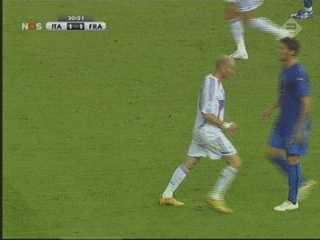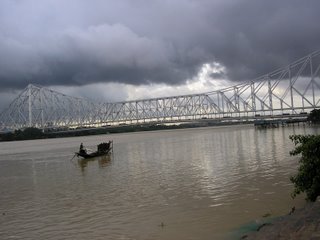 My friend TK has scribbled here about Garfield Sobers, and Sachin Dev Burman; two great people who had their birthday on the 28th of July. Since I am not much of a cricket aficionado to actually write something worthwhile about Sir Garfield Sobers, I shall stick to what I am arguably good at, that is music.
My friend TK has scribbled here about Garfield Sobers, and Sachin Dev Burman; two great people who had their birthday on the 28th of July. Since I am not much of a cricket aficionado to actually write something worthwhile about Sir Garfield Sobers, I shall stick to what I am arguably good at, that is music.Be it Devdas, or the folksy tunes of Bandini, or the rollicking new-wave in Chalti Ka Naam Gaadi, Sachin Dev Burman has done it all, and with each movie that he composed for, he let us know in a small way that though in years, he was older than us, at heart, he still had the same vitality, vigor and simplicity which has always defined his music. This soft-faced, bespectacled maestro always remained under-rated in Bollywood, like several other music composers who had oodles of talent but failed to cater to the loud pretentiousness of the film-industry. SD Burman was however, a late-bloomer, a person who made it big only after he reached his forties.
Burman was born in Tripura in 1906, and his childhood was interspersed with woodland treks and music lessons from his father. The influences of childhood show in his music, in the simple folk which he manages to infuse into his melodies. It was Ashok Kumar, who was instrumental in SD Burman getting his bigger breaks in Hindi movies, and by the fifties he was amply famous as a composer of lilting melodies and harmonies. It was however, SD Burman’s association with Dev Anand, which marked the most important, and arguably, the most musically-rich phase of his career. Though inherently Indian in his thoughts and music, the long association with the stylized and westernized Dev Anand, brought about the transformation in Burman’s music into a heady concoction of Indian tunes and western orchestration.
In spite of the fever of opulent and mostly garish orchestration which was raging through Indian music, propelled by the lavish songs of Shankar and Jaikishen, SD Burman continued to rely on minimalism. His songs remained vocal-oriented, and the music supported the song, rather than override it. Most importantly, he realized the importance of correct placement of a song in the movie. In a very interesting article about song-less Indian films, SD wrote that rather than place a song in an uncomfortable position in the movie and disgust the audience in the process, it is infinitely better to remove the song in its entirety.
For me, on a totally personal level, SD Burman ranks alongside Salil Chowdhury in my list of favorite music composers in Bollywood. I rave about Salil Chowdhury for his amazing knowledge and erudition, and I love SD Burman because of the inherent simplicity in his music. Both are greats in their own right, and both always had a distinctive style in their approach to melody and orchestration, which never ceases to amaze me in its variety.
Rather relaxed evening yesterday. Came back from band-practice at around seven thirty in the evening after watching a totally plot-less and story-less Pirates of the Caribbean. The evening was made by a revisit to one of my favorite Ray films – Goopy Gyne Bagha Byne. I never ceased to be amazed every time I watch this movie and wonder how a man could make a movie for children so acceptable and so natural for adults to watch with none of the subtle embarrassment which normally accompanies a man as he watches a children’s movie.
Spoiler warning: Plot details follow
The story revolves around Goopy, the son of a poor grocer in an impoverished village in Bengal. In spite of a rather unimpressive and coarse voice, Goopy harbors great ambitions of name and fame as a singer. Eventually he is cleverly persuaded by some village elders to sing a song for the sing in the early hours of dawn, perched on a rock outside the king’s window. The king, not accustomed to being an early riser, is enraged by this disturbance to his morning stupor, and orders him to be thrown out of the village on the back of a donkey.
Exiled into the forest, Goopy meets Bagha, who has met with a similar predicament, and together, they form arguably the greatest comic duo in Bangla cinema ever. It’s there in the forest that they encounter a roaming tiger who comes close but not too much, and then overjoyed by the narrow escape, they start singing and playing, very badly. Night falls, and that is when the King of Ghosts (Bhuter Raja) is absolutely overjoyed with their singing, and grants them three boons.
- They can get food anytime, anywhere.
- A pair of magic slippers which taken them anywhere, anytime.
- Incomparable singing and drumming skills. (Needless to say, that’s something I wouldn’t mind either)
Overjoyed, and slightly fuzzed by the sudden change in their fortunes, the duo travel to the kingdom of Shundi, where they meet a benevolent king with a great interesting in music, played by the inimitable Santosh Dutta (who also plays Jatayu in the Feluda series) who is again dumbfounded by the musical skills of the duo and appoints them as court musicians. The king of Shundi however, has no interest in kingdoms and acquisitions whatsoever, and is a peace-loving man.
In the meantime, the king of Halla (who is actually the long-lost brother of the king of Shundi), goaded by a lethal evil minister, who hypnotizes him with the powers of the court magician, plans a scathing and final attack on his own brother. On the bequest of the king of Shundi, Goopy and Bagha travel to Halla in an attempt to prevent the king from attacking, but due to a mixture of foolishness and inattentiveness are inadvertently captured. In the process, they also lose the magic slippers, which could have taken them out of captivity and realize that the only way of escape is through strategy. This they do brilliantly, as they trick the jailer into releasing them, and then come upon the army just as they are about to get ready to start their march towards the kingdom of Shundi. The entire army is captivated and frozen by the sheer beauty of their music, which leads to their king ultimately getting capture, and reunited with his long-lost brother.
The movie has a simple plot, akin to the fairy-tales which came from Russia in beautifully illustrated but extremely cheap books.
The beauty of the movie lies in the simplicity of the gestures, the music and ultimately the rather beautiful message is delivers of non-violence and the futility of war. The subtle humor in the movie when contrasted with some of the slapstick comedy which is dished out of Bollywood, Tollywood and Hollywood, would hopefully, someday prove to be a lesson for directors, producers and actors et al.
Just as an example, I find the sequence where Goopy and Bagha gaze upwards at one of the towers in the palace, where Bagha has accidentally spotted a princess (Monimala), the daughter of the king of Shundi. They watch entranced, as Bagha, played by the great Rabi Ghosh, paints a beautiful picture of marriage to Monimala. While Ray’s camera was like a poet, what amazed in this movie was the sheer power of the dialogue. The way Bagha utters Monimala; in a subdued yet subtly excited voice is a miracle in restrained acting. The music-competition is one other example of extremely vivid characterization and the best and most composite tribute to Indian Classical Music, if any. Characterization, as in any other Ray movie, is top-notch, with Santosh Dutta playing the part of both the benevolent and the lost king with equal aplomb. And of course, you can’t think of two other people playing the roles of Goopy and Bagha with equal conviction. Ultimately, you are amazed when the movie ends; because that's when you realize that it is perfectly possible and remarkably easy to despise the violence, crime and bloodshed of present times without showing any of it. Ray did that with perfection, as Goopy and Bagha approach the army of Halla singing:
Tora judhho kore korbi ki ta bol (What’s the use in fighting this war?)
O re Halla rajar' Sena (O the army of Halla)
The song of the little road
6 Comments Published by Sheer melody on Tuesday, July 18, 2006 at 3:00 PM. Ok, I had a terrific experience watching Pather Panchali yesterday. There have been very few movies which have held me totally enthralled, and to tell the truth, this was one of those rare movies which had that capability. Put very simply, this was a movie which made poetry on film a reality.
Ok, I had a terrific experience watching Pather Panchali yesterday. There have been very few movies which have held me totally enthralled, and to tell the truth, this was one of those rare movies which had that capability. Put very simply, this was a movie which made poetry on film a reality.Spoiler warning: Plot details follow
Based on Bibhutibhushan Banerjee’s novel of the same name, this movie is centered on a poor family in rural Bengal struggling to make both ends meet. The husband is frequently away from work. The struggles of the mother trying to train the mischievous Durga, and trying to control the elderly Aunt Indir Thakuran are the talking point of the first part of the film. That’s when Apu is born, and happiness, play and exploration become a part of the family’s daily feelings. Durga and Apu’s bond is an intimate one, and one to be cherished. Death comes early in the film, when they stumble on the dead body of their pisi (aunt) Indir. The monsoons come to the village and Durga gets drenched in a joyous dance in the rains, while Apu cowers under a tree. Durga falls ill after the dance, and on a stormy night, as Sarbojaya (Durga and Apu’s mother) tries her best to close the doors on the rain and wind, Durga dies. This represents the climax of the film, and a heart-broken family leaves the village for Benares after Harihar, the husband returns, in the hope of a new and better future.
The last time I had seen Pather Panchali was when I was twelve years old, and to be quite frank, I remembered bits and pieces of the film. Watching it yesterday, on a well-restored DVD was an enriching and rather fulfilling experience after all these years. This was Ray’s first film, made immortal by the stories of the enormous amount of struggle which the budding director had to go through to complete the film. This was followed by the two other movies of the trilogy: Aparajito and Apur Sansar. The most interesting part of the movie is the way it deals with drama without indulging in melodrama. It’s a lesson in subtlety and one of those movies which accepts the fact that the viewer is an intelligent person and has the brains and the inclination to figure out things for himself. Right from the characterization of the old woman, Indir Thakuran with a penchant for kleptomania, to Durga and Apu’s wanderings through the village, as they come across a candy-seller, a wedding ceremony and the first sight of a running train, everything is beautifully picturised and filmed. Interestingly, when this film had been released, some critics had found it too slow, to which Ray had replied: The cinematic material dictated a style to me, a very slow rhythm determined by nature, the landscape, the country. The script had to retain some of the rambling quality of the novel because that in itself, contained a clue to the authenticity: life in a poor Bengali village does ramble.
There are a number of rather inspiring and delicate scenes in the movies, but some of which will forever stay in my memory are the candy-seller sequence, with the stray dog in trail, reflected in the simmering waters of a lake; Durga dancing with sheer joy in the rain; the coming of the monsoons picturised with water flies dancing on the surface of the water; Apu and Durga running with unbridled joy towards the first running train of their life through a field of kaash flowers. Beautiful! Simply Beautiful!
Some interesting trivia on the film:
Shivam Vij has his comment and his reaction on the whole fiasco:
Then I called up a senior MTNL engineer who’s in-charge of these things, Mr. R.H.Sharma. Mr Sharma was polite and helpful and said that he had a long 22-page of list of sites, sent to him by the National Informatics Centre, and he would needs two hours to go through it and find out if it contains any Blogspot or Typepad site! But he said that as far as he knew MTNL had not blocked blogspot per se. I called up a senior Spectranet official who confirmed that the Department of Telecommunications (not the Ministry of IT) had on Friday sent a list of sites to be blocked. This is the same list, it seems, that MTNL’s Sharma was telling me about. This list is not public. It deserves to be.
As Indian bloggers pen down their frustrations, and Mumbai recovers after the serial blasts of July the 7th, it seems ironical that in the aftermath of a disaster, India had to join the elite company of the less free nations of the world.
CERT-IN's (Computer Emergency Response Team of India) director, Gulshan Rai had a hilarious response to the whole issue: Somebody must have blocked some sites. What is your problem?
Banning of blogspot reminds Pakistan's tactics to thwart the spread of the Danish cartoons ridiculing Prophet Mohammed, and though it may look utterly strange and an extremely strange move, there is a slight possibility that Indian ISPs in overt zeal and enthusiasm, blocking entire domains when the requirement was the blocking of certain sensitive blogs hosted on blogspot and typepad. There is news floating in as I write that geocities weblogs have also been blocked in Mumbai via Airtel. With the above blanket-ban, India joins China, Saudi Arabia and Pakistan in the list of countries which regulate access to the world-wide-web.
For the press coverage of the ban, please look here.
Interestingly, the following sites have also been blocked (courtesy: Ultrabrown)
As the blogging community cries itself hoarse on the issue, I sit back, and wonder, for the n'th time - Isn't it about time, we had more sensible and intelligent people in the team of people making important decisions in the government? Does the government think that terrorists would keep blogspot, a public forum as their one and only means of communication with each other? And, even if they actually do so, would they be so computer and internet-illiterate as to not know about web-proxies and anonymous browsing to circumvent such bans? And isn't it rather naive to believe that proponents of SIMI and terrorism would be ignorant of other webhosting sites like Yahoo! 360, Msn spaces, et al. Interesting questions, with no answers forthcoming!
The exam starts, and Prashant, after one look through the set of twenty questions (as expected) realizes that he knows nothing (again as expected). Invigilation is strict and it is becoming tough to copy from the person near him. Prashant looks behind his desk and observes to a certain level of satisfaction, Bornik furiously scribbling on his examination sheet. It is apparent the Bornik knows a lot. PD puts one hand in his pocket, takes out the piece of paper, closes his grip on it and places it on Bornik’s table, maintaining a straight face and looking straight on. A rather interesting conversation ensues –
Bornik: Yeh Kyon de raha hai (Why are you giving this?)
Prashant: Abbe, answers likh de, 2 minute lagenge (Hey! Write down the answers, it’ll take just a moment)
Bornik: Iski kya zaroorat hai? aise hi bol deta hoon. (What’s the need for this? I shall tell you anyways)
Prashant: Abbe, tu samajh nahin raha hai. Bolna tough hai. (You don’t understand, it’s not easy)
Bornik: Abbe, main bol raha hoon na (I am telling you, no!?)
Prashant (tone of resignation): OK
Furious exchange of answers, helping Prashant to scribble enough on the scrap so as to secure a pass-grade. The end of the exam is signaled by one of the shriller bells on campus, and half-smiles on the faces of the professors, and Prashant gives his answer-sheet up. Prashant packs his things up, and straps his bag on to his shoulder.
Bornik comes over to Prashant’s desk, his face clouded over, quite obviously with anger, frustration and bewilderment. He bangs his fist down on Prashant’s desk with a mixture of fury and calmness, and walks away. Prashant stares at what he has placed on the desk…
It’s a ten-rupee note. Prashant looks flabbergasted. He places his hand gingerly into his shirt pocket, and pulls out the clean sheet of paper on which he had put in the place-holders for the twenty questions, virgin and untouched.
 As Mumbai was dogged by serial blasts, news floated in of the death of Syd Barrett. He had been suffering from diabetes for several years.
As Mumbai was dogged by serial blasts, news floated in of the death of Syd Barrett. He had been suffering from diabetes for several years.Barrett was one of the co-founders of Pink Floyd in 1965 with Roger Waters, Nick Mason and Richard Wright, and was the leading light behind most of the band's earlier songs. Famous for most of the earlier hits, especially the largely lyrical and critically-acclaimed Pipers at the Gates of Dawn. Unfortunately, Barrett couldn't draw a mental line on his use of LSD, and became a victim of the madness of which he had written so many songs. He had to quit the group five years before the release of Pink Floyd's most successful, and arguably, best album The Dark Side of the Moon. He released two solo albums The Madcap Laughs and Barrett, before withdrawing from the music business altogether. The rest of his life was spent living quietly in his hometown of Cambridge, England. He is famous for taking short trips to nearby grocery-stores on his cycle and not talking to curious fans and journalists who tried to talk to him.
Considered a rather mentally fragile musicians, this man was the inspiration behind several of Pink Floyd's later songs and albums, more specifically Shine on you crazy diamond and Wish you were here. He was a big inspiration for David Bowie and his song See Emily Play.
- CNN-IBN was the first to report the blasts.
- More people all over the world are listening to CNN now thanks to CNN-IBN.
The entire blogging community has been furiously scribbling notes, articles, comments, and posts. Hats off to this site for a continual update.
A rather poignant comment on one of the blogs:
It is 12:30 am here in Bangalore, but I cannot go to bed because there is a man outside the window yelling on the phone. He has been trying to reach his wife and children in Mumbai since 7 pm, and is increasingly getting desperate. I have been listening to him for the past 20 minutes, and his tone switches between angry, anxious and hopeless as he talks to his other relatives and friends. His voice breaks often. I don't know what to do - he is obviously alone, but the last thing he needs right now is for a stranger to approach him with "everything will be alright". It breaks my heart.
Update: It seems this guy has finally been able to track his wife and children who were stranded somewhere in South Mumbai.
Apt description: After the expulsion of Saddam’s forces from Kuwait City in 1991, the British journalist Robert Fisk described as best he could the imperial dungeons, makeshift prisons, and seeping stench of rotting flesh and oil. “Something evil,” he wrote, “has happened here.” Yesterday, something evil happened in Bombay.
Here is the supposed involvement of SIMI in the blasts. LeT of course is the multi-faceted scapegoat of all troubles. I am waiting for Dawood's name to come up as a prime suspect, and a few movie-stars/starlets.
Interestingly, right-wing bloggers in the US, like Hugh Hewitt are linking the blasts with a selfish pro-Bush propaganda. Hugh Hewitt, please shut up. And of course, we have Captain Ed of the Captain's Quarters blog. This commentary has already been dissected by Curious Gawkers, and several others, so maybe this is just another dissection. Interesting glimpses of Captain Ed's erudition:
- It looks like al-Qaeda or an Islamofascist offshoot has decided to add another nation to its blood enemies. Add India? Really?
- What motivated AQ to go after India? It's hardly the first country one associates with the West, and many Muslims live within the majority-Hindu nation. So the conclusion is that terrorists only attack the 'West'
- India's troubles with religious sectarianism (especially with Muslims) go back centuries, of course, and the historical irritants would have been enough for them in any event. Huh!
India has been a target for Islamofascist terrorism, and Bombay has been a target since the 1993 serial bomb-blasts. Quite clearly, Captain Ed has just woken up from a decade-long slumber, discovered India as a developing nation in a curious corner of the globe, and still assumes that most of us go to office on elephants. Sometimes the knowledge levels of some of these Americans is galling, and I can't help but giggle.
Interesting information (though not credible, coming from DNA): “Parcel train mey chhodke sab Malad mey milengey.” [After leaving the parcel on the train, let’s all meet in Malad, a northern Bombay suburb.] Sandeep Singh, a Ghatkopar resident in his mid-20s, overheard this seemingly innocuous piece of conversation between three men outside the Churchgate station at 5.30 pm on Tuesday… According to Singh’s statement, two of the three men had been bearded and were wearing Pathan suits. All three were carrying similar-looking parcels which looked like gift boxes.
Terrible reality by Dilip D'Souza: Suketu Mehta wrote once, and famously, of hands unfurling from a packed Bombay train compartment like petals, reaching out to grab that one more commuter and whisk him on board. Here the metal of the compartment is unfurled like some grotesque petals, side and top.
First-person account: At around 6.20 pm, Shah was on a Western Railway foot over-bridge, crossing from Mahim West to the East, when he heard a loud bang. He looked down to see a train moving quickly beneath the bridge, coming to a halt a few seconds later.
At first, he assumed it was a short circuit that led to the halt. When he took a second look, he saw dead bodies flying out of the Borivali-bound fast train. Blood was flowing like a river all around… he ran down to the tracks to help people trapped in the train. The first class compartment, where the bomb was placed, had been reduced to a tangled mass of metal in seconds… Locals were seen consoling unknown passengers who couldn’t believe their near and dear ones were no more. Some women couldn’t bear the sight and started vomiting on account of the bloodstains on their bodies… “We stopped many cars and Tempos to take the bodies…”.
Compensation news: Although there is no price for a life, The Indian railway minister, Laloo Prasad Yadav, has announced financial help for the victims and their relatives. He said relatives of those killed will get 500,000 rupees ($11,000) each.
It's however quite remarkable and pleasing that there has been no communal aftermath to this: The most recent terrorist attacks in India took place in Delhi, suffered no retaliation incidents, even though all the Islamic jehadis want is a holy war (jehad). What's galling is New Delhi's inability to punish the guilty since time immemorial. On the one hand we have Israel going overboard over one soldier, and we have Manmohan Singh, gawking at Sonia Gandhi in his air-conditioned office, wondering when the next blast is...
And of course, Pervez fucking Musharaff had to condemn the attacks. Huh!
Interesting article by Prof. Sumit Ganguly in Foreign Affairs magazine: Accordingly, the Pakistani government continues to support the insurgents, although more subtly than before. But what the Musharraf regime and its more intransigent Islamist allies fail to recognize is that Indian patience with Pakistani-sponsored violence in Kashmir and elsewhere in India is nearly at an end. Although largely ignored by the U.S. media, bombings during the festival for the Hindu holiday of Diwali in New Delhi last November, in which Pakistani-based groups were implicated, almost precipitated another major crisis, which was averted only by the Indian leadership's restraint. But it is far from clear whether such forbearance could survive another attack. Furthermore, in contrast to the 2001-2 crisis, when the Indian military lacked viable plans for responding to a Pakistani-based terrorist attack, the Indian army is now well prepared to undertake swift and decisive action by retaliating against targets in Pakistan at times and places of its own choosing. Unfortunately, the Pakistani leadership appears to be oblivious to India's growing frustration. Consequently, although another Indo-Pakistani war is not likely, it remains possible."

Ok, I don't know why he had to do it... It made no sense. We all knew it - poor sportsmanship never wins. Did Zidane really need to do this to make us understand that?
Questions have crept up: Was the action justified? Maybe never. Professional outbursts are known in every game, and more so in football, where it tends to take a rather offensive turn more often than not. But as most people would agree, it would never do well to condone such an act. But I do wonder, what was it that Materazzi said that provoked this player (albeit with a history of violent behaviour) to react in such a manner?
All said and done, maybe it was this ridiculous action which gave Italy the cup, gave the French people the final heartbreak. And most of all, it was saddening to watch this footballing great leave the pitch in such an unsatisfactory and despondent manner. I had hoped, after that rather unsavoury incident with the Saudi Arabian footballer, that he would have a chance of leaving the game - as the French say - with beauty, but that was not to happen. This final act has ensured that most people will remember this final with a slight wince - except, of course in Italy.
But well, nothing and no-one can take his achievements away from him. The dust will ultimately settle and he will be re-instated in the list of all-time greats. On a footnote: France lost the World Cup, but Italy never really won it for themselves!
I am back to writing and commenting on favorites. It’s always easy to write about favorites – so I have decided to make this post really interesting. Which would mean that, as a footnote to this post – I will have a link or rather a PostScript with the ten worst movies which I have been unfortunate enough to watch. Before you read this, do be warned that I am a disgruntled movie fanatic. Some comments may seem unpalatable to several people.
I hope you have as much fun reading this as I had writing it…
My favorites:-
- Pulp Fiction: Quentin Tarantino makes one of his greatest movies. This movie was as great as it was important for the manner in which movie-making confined to genres were combined together to form a rollicking adventure. Some say it was so ahead of its times that it failed to win anything other than Best Screenplay at the Oscars. The Oscars don’t really matter that much to me – for me, Pulp Fiction would stand as one of the top-ten movies of all time, not just for the action, the direction and the screenplay – but for the way it made directors and movie-makers rethink their movie-making strategies.
- The Shawshank Redemption: It is always tough to adapt a full-length novella into a movie, something which Satyajit Ray would definitely agree with; and this movie was one of the rather powerful and eminently-watchable book-adaptations of all time. Ironically, it was after this movie that cooped-littérateurs were forced to admit that Stephen King, indeed, was a good writer and not just a genre hack as he was portrayed. This movie gives two actors, Morgan Freeman and Tim Robbins, giving performances of a lifetime. Powerful acting, Powerful direction and extremely sad, yet inspiring, this movie uplifts me every single time I watch it.
- The Apu Trilogy: I tend to favor Aparajito as the best of the three movies in this trilogy; however I do tend to agree with most seasoned movie-goers that each of the movies in this trilogy tugs unceremoniously at your heart-strings, almost to breaking point. As the TIME issue of September 26, 1960 says: Director Ray reveals an order of poetic insight and a gift of visual anecdote that combine to produce some astonishing effects. All in all, this was the style of movie-making that is simplistic almost to an extreme, yet so profoundly strong in its impact, that it’s tough to ignore. As Kurosawa said: The kind of cinema that flows with the serenity and nobility of a big river — the river of life as it is ordinarily lived. A fascinating review by Roger Ebert: http://rogerebert.suntimes.com/apps/pbcs.dll/article?AID=/20010304/REVIEWS08/103040301/1023
- A Hard day’s night: Considering the fact that this movie was shot in the way it was, it’s a miracle that it is not a mess. In fact, it’s one of the most honest movies about rock ever made; for the simple reason that it is funny, expressive and joyful. It was about a time where rock stars lived a life without principle, where enjoying the money you earned was not considered a crime and wasn’t frowned upon by prudish critics. It’s got some really good songs too. As TIME said: More than a movie, it was an answer to a maiden’s prayer.
- The Godfather: They don’t make gangster movies like this anymore. Other than the rather badly made Sarkar in India, starring Amitabh Bachhan at his hamming best. This movie is a lesson in movie-making, in how a movie can be made so dark and depressing, and at the same time, have a profound impact on the audience. The flawless acting by De Niro, Marlon Brando, and of course, Al Pacino, and the grandeur of it all, gives this movie nobility in all its gloominess. It has the power to make you feel terror, pity; best of all – it even makes you smile. Critics have said it is a pop masterpiece. Well, definitely – but it IS a masterpiece, after all! Tidbit: Brandon’s only flaw was that he would not, or could not learn his lines, and would read them from carefully hidden cue-cards.
- Schindler’s List: Another epic movie, a documentary on the holocaust with an absolutely amazing usage of the black and white oeuvre. Before the war, Schindler was a scheming playboy of the Third Reich. After the war, admittedly he was a failure. But during the holocaust, he was afflicted with a grace, saving and abetting Jews in their flight from misery. Laced with grim foreboding, this movie is a bland, unprovocative account of the holocaust, with an unforgiving eye, powerful unstoppable drama, high morality; leading to a movie which simply escapes the bounds of conventional criticism.
- A Streetcar named Desire: Famously regarded as the best adaptation of a play, and TIME in its selection of 100 best movies of all time, does not disagree. Marlon Brando, in a repeat of his stage performance as Stanley Kowalski, is menacing in his portrayal of this child-animal-beast rolled into one; and Vivien Leigh is masterful in her portrayal of the sensuous flirtatious half-mad-sister-in-law, who teases him back and forth, ultimately resulting in the brutal rape which destroys her in completeness. It is one of the movies in Hollywood, with a substantially honest analysis of human flaws and foibles. Magical!
- Psycho: The dark and stormy night, raindrops splattering onto the windshield, the not-so-innocent movie, the nut-case at the hotel played brilliantly by Anthony Perkins, nobody did it better than Hitchcock. The gruesome explanation of the murder when the movie was released made TIME magazine call the movie stomach-churning. However, all through the original, the director’s style, his grandeur, his formal elegance, and the way he impresses his favorite themes on us – guilt, obsession, and ultimately greed; enthralls me every time I see it.
- Charulata: One movie which made me believe that Ray was not ethnographer of exotic poverty. This is one movie which I have reviewed in detail, in one of my previous posts – so I will not go into a lot of detail. Let it suffice to say that the tussle of a house-wife, buffeted between two unworthy men, her husband and brother-in-law (original story by Rabindranath Tagore) was made into a brilliant movie. It is a modern movie and definitely one of the all-time classics.
- Forrest Gump: For me, any movie-review would remain incomplete without this movie. Dubbed by several critics as another populist entertainer; I have persuasively begged to differ at all points of time on this. The story of a rather stupid, small-town boy in his travails across America has made for easy viewing. I find the movie fascinating because of the social picture it portrays of 60s-America; I love it for its carefully-chosen and handpicked soundtrack, some absolutely beautiful imagery, and a swash-buckling performance by Tom Hanks. Finally, I love the scene where Forrest dances with his childhood-sweetheart to the tune of “Sweet Home Alabama”.
Since I am now done with my top-ten movies of all time – I will now bestow a thought on the worst movies I have personally had the pleasure of watching (and in some cases – have watched them in theatres).
Here goes:
- Speed 2 – Cruise Control: This was one of those movies which I watched in-spite of repeated suggestions. The movie was a flop – even at the box-office. Interestingly, Leonard Martin in his Movie Guide wondered rhetorically if any of the cast had actually read the script before signing on the movie. It was nominated for eight Golden Raspberries, and won the award for the Worst Remake/Sequel.
- Batman and Robin/Superman Returns: I have placed both of these at the same level – for the simple reason that I could not find a better way to link both of these together. Both extremely badly-made movies, with actor George Clooney going as far to say that he would refund people’s money if they stopped him on the street and said that they had paid to see it. Interestingly, Batman and Robin also had a poorly-played version of Batgirl, by Alicia Silverstone (remember Crush). Superman returns; well the least said – the better…
- Freddy got fingered: I didn’t get through the second-half of this movie; so the only comment which I have is Roger Ebert’s comment: This movie doesn't scrape the bottom of the barrel. This movie isn't the bottom of the barrel. This movie isn't below the bottom of the barrel. This movie doesn't deserve to be mentioned in the same sentence with barrels...The day may come when Freddy Got Fingered is seen as a milestone of neo-surrealism. The day may never come when it is seen as funny.
- Glitter: Few films are worse than this. It's completely forgettable, derivative, and bland in every way. Mariah seems worse than Whitney in her acting. Really bad music, a rehashed story, bad acting and horrendous dialogue make it tops in the worst-movie category.
- Black: I have to admit, I hate this movie because the critics lauded it as a landmark Bollywood movie, and I did not even find it close to being a good movie. Amitabh Bachhan was at his best with his hamming, tottering and dialogue without conviction. Overbearing music, blatant use of scenery to influence emotion, and an absolutely over-dramatic, makes it one of the worst movies I ever watched (and that too-in a movie-hall)
- I still know what you did last summer: For those who haven’t noticed the still in the title, it is a sequel and an extremely pointless one – to I know what you did last summer. Appropriately titled bubble-gum horror flicks. I could go into the rather contrived storyline for this movie, but since the directory didn’t care much about it, it seems rather pointless. Danny Cannon falls back upon blood, gore and over-dramatized anxiety and goes several inches over the top as he does so. Performances were lifeless, boring and as one rather disgruntled movie-goer said: “I still know what I did last summer. I wasted two hours and a hundred bucks watching this movie”
- Anacondas – the hunt for the red orchid: This movie is a sequel to Anaconda. The prequel had a few stars in its cast; this one has Morris Chestnut as the star. It shows – the prequel wasn’t great, but this is worse. It’s a total waste of celluloid canvas. Even fans of killer anacondas wheezed as they walked out of the theatre.
- Neal and Nikki: Yes, I watched this movie. I repent it. It was the worst movie to come out of the Yash-Raj stables, and throws everything, Veer Zaara, and all the other crap which Shah-Rukh Khan has dished out over the years far behind. The movie makes little sense; the songs make far less sense. All in all, stay at home and watch POGO.
- Mangal Pandey – The rising: Seriously, what’s this movie about? Homo-erotic men, dancing around? Sati? Courtesans? The freedom struggle? If anyone manages to figure out – do let me know…
- Garam Masala: This is one other movie which tends to make you feel that Bollywood is indeed bankrupt of ideas and imagination. Frankly, the biggest dud to be delivered by Priyadarshan so far. The music is forgettable, the rhetoric is inconsequential, and the acting is just about passable. The problem is that the sequences which were meant to be comedy sequences don’t really impress and quite frankly, fail to make you laugh. Definitely, one of the worst to come out of Bollywood.
The mess that is Howrah Station
0 Comments Published by Sheer melody on Monday, July 03, 2006 at 5:55 PM.One of the busiest railway stations in the country - it enervates and enthralls me at the same time!
Place where I spent the best years of my life. Right from Prep to the rather tough times in class 10, this was the school which made me what I am today. Lovely place, great teachers, it was the place to be!

That's my house in Bombay, Sun Srishti Complex, Saki Vihar Road, Powai
 That's Bureau Takanawadai, near Takanawadai station in Tokyo, where I put up and burnt the hotel mattress, leading them to charge me 10000 Yen!
That's Bureau Takanawadai, near Takanawadai station in Tokyo, where I put up and burnt the hotel mattress, leading them to charge me 10000 Yen!
 That's All Season's Place in Bangkok, housing the GE Money Bank headquarters where I was posted for around a month in a FLEXCUBE implementation for i-flex. Had one of my best times there...
That's All Season's Place in Bangkok, housing the GE Money Bank headquarters where I was posted for around a month in a FLEXCUBE implementation for i-flex. Had one of my best times there...
 That's Benaulim beach, which was our haunt for most of the time during the goa trip. For more information on the Goa Trip, do visit http://thesaintbycompulsion.blog.com
That's Benaulim beach, which was our haunt for most of the time during the goa trip. For more information on the Goa Trip, do visit http://thesaintbycompulsion.blog.com

And last, but not the least, Vagator beach, which presented to me the best and most serene examples of beauty ever seen, on a moonlit night. This was also the place where I realized how much I loved my girl, and how stupid I had been up till now!
Peace!!!




